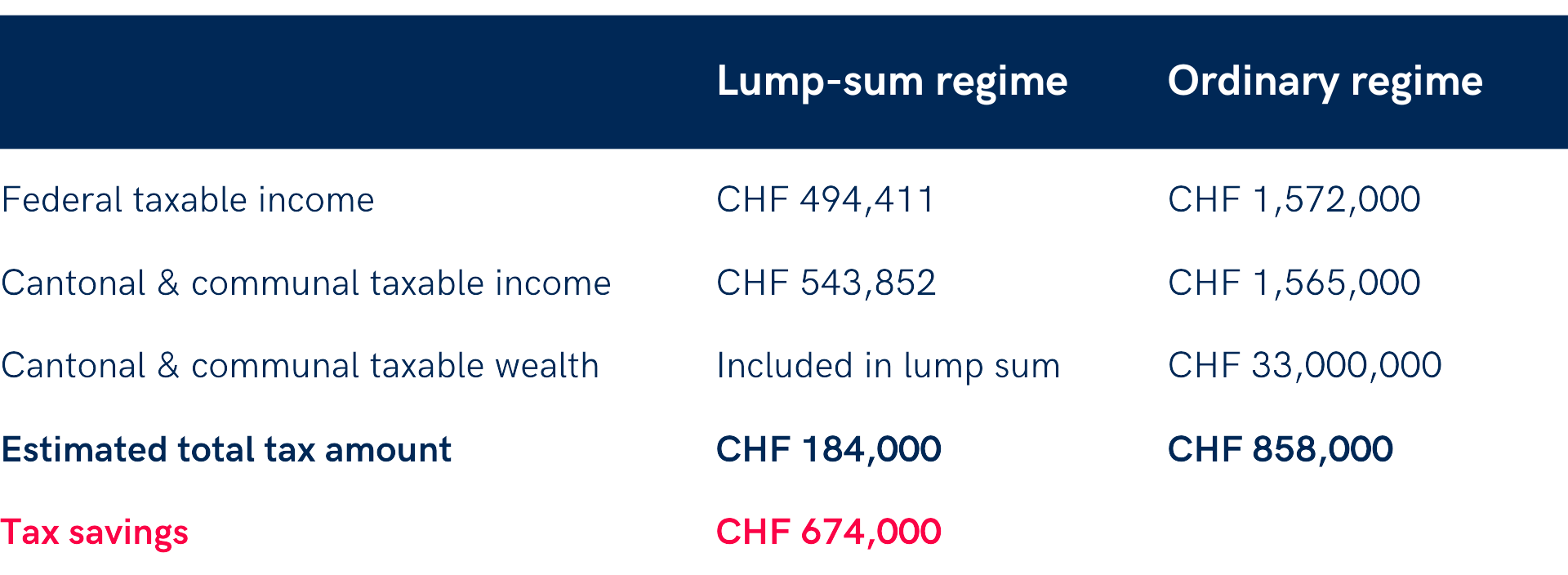The benefits of the lump-sum taxation regime in Switzerland


Ab April dieses Jahres wird das Vereinigte Königreich erhebliche Änderungen an der “non-domestic resident”-Regelung vornehmen und sie damit weniger attraktiv machen. Ebenso wird Portugal ab Ende April 2025 vergleichbare Änderungen an seinem “non-habitual resident”-Regime umsetzen.
In light of these evolving international tax frameworks, it is an opportune moment to consider the Swiss equivalent: the lump-sum taxation (also referred to as “expenditure-based taxation” or “forfait regime”). This system allows foreign taxpayers to be taxed on a simplified and fixed basis, calculated according to their living expenses rather than their worldwide income and wealth.
Unser Team von Spezialisten hat im Laufe der Jahre umfangreiche Erfahrungen bei der Verhandlung solcher Lump-Sum-Vereinbarungen gesammelt. You can rely on our expertise to help you navigate this complex tax environment.
Eligibility conditions
Um sich für die lump-sum-Besteuerung zu qualifizieren, muss der Steuerzahler (oder beide Ehefrauen, wenn er verheiratet ist) alle der folgenden Bedingungen erfüllen:
1. Not hold Swiss nationality;
2. Be subject to unlimited tax liability in Switzerland for the first time, or after an absence of at least ten years;
3. Not engage in any gainful activity in or from Switzerland.
This tax regime must be required by the taxpayer, either before his/her arrival in Switzerland or at the latest, prior to his/her first taxation.
Berechnung der Steuerbemessungsgrundlage
The lump-sum amount is agreed upon with the relevant cantonal tax authority and is set as the highest of the following three figures:
1. Seven times the deemed rental value of the property acquired by the taxpayer in Switzerland (as assessed by the competent authorities), or seven times the annual rent if the taxpayer is renting a property;
2. The taxpayer's total annual worldwide living expenses (including taxes);
3. The minimum tax base set forth by the law (as indicated in the following chart):

In addition, when completing the tax return, the tax due on the basis of the lump-sum shall be compared with the tax theoretically due on the taxpayer's Swiss income and assets (so-called “control calculation”). If the amount of tax resulting from the control calculation is higher than the amount of tax due on the lump-sum, the control calculation takes precedence.
Interaktion mit Doppelbesteuerungsabkommen
Grundsätzlich können Steuerpflichtige, die unter das lump-sum regime fallen, von den Doppelbesteuerungsabkommen der Schweiz profitieren. However, certain treaties (notably with Germany, Austria, Belgium, Italy, Norway, the United States, and Canada) apply only if income from these countries is subject to taxation in Switzerland.
Vergleich zwischen lump-sum taxation und ordinary taxation (Beispiel)
Frau Wagner, eine pensionierte deutsche Staatsangehörige, hat bislang im Vereinigten Königreich unter der “non-dom”-Regelung gewohnt. She decides to relocate to the canton of Geneva in 2025. Her assets-exclusively non-Swiss securities-amount to CHF 30 million, generating an annual return of CHF 1,5 million. She purchased a house in Collonge-Bellerive, where she now resides. The property has been valuated by the tax authority at CHF 3 million, with a deemed rental value of CHF 80,000 per year. Her annual living expenses (excluding taxes) amount to CHF 350,000 per year. The tax comparison is as follows:

While some countries are significantly tightening their tax regimes, Switzerland continues to offer attractive opportunities through the lump-sum taxation. This regime involves specific procedures and requires close monitoring. Our tax team, with its solid track record in negotiating such arrangements, is available to answer your questions and support you throughout every step of the process.
Neueste Aktualitäten

Véronique Pipoz devient COO du Groupe
La nomination de Véronique Pipoz au poste de Chief Operating Officer (COO) marque une nouvelle étape dans le développement du Groupe.

Nouveautés RH pour 2026
L’année 2026 marque plusieurs évolutions majeures en droit du travail, assurances sociales et fiscalité, avec des impacts concrets pour les employeurs et les salariés. Nous faisons le point sur les changements au niveau national ainsi que sur les mesures spécifiques au canton de Genève.

Votation populaire du 30 novembre 2025 : initiative pour l’avenir
Le 30 novembre 2025, les électeurs suisses seront appelés à se prononcer sur une initiative visant à instaurer un impôt fédéral de 50 % sur les successions et donations dépassant 50 millions de francs. Pensée pour financer la transition écologique, cette mesure soulève des questions concrètes pour les familles propriétaires de PME, les entrepreneurs et les détenteurs de patrimoine important.